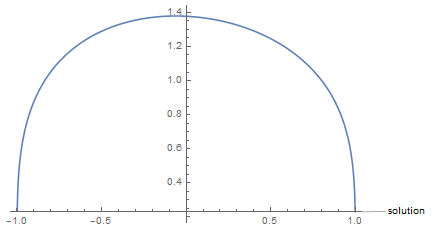DSolve is a symbolic solver and did not find it a solution.We have to use a numeric solver NDSolve.
w = 0.7;
q = 0.5*w*(1 - x^2);
kappa = 1.469;
sol = With[{eps = 10^-5}, NDSolve[{y'[x] == (560*y[x]^0.5*q - 64*y[x]^4 +
6*w^(7/8)*(72*kappa - 77)*x*q*(-w*y[x]))/(3*w^(7/8)*(96*kappa - 77)*q^2), y[-1 + eps] == eps}, y, {x, -1 + eps, 1 - eps}]];
Plot[{Evaluate[y[x] /. sol]}, {x, -0.999, 0.999}, PlotLabels -> "solution"]

with High Precision:
w = 7/10;
q = 1/2*w*(1 - x^2);
kappa = 1469/1000;
sol = With[{eps = 10^-18},
NDSolve[{y'[
x] == (560*y[x]^(1/2)*q - 64*y[x]^4 +
6*w^(7/8)*(72*kappa - 77)*x*q*(-w*y[x]))/(3*
w^(7/8)*(96*kappa - 77)*q^2), y[-1 + eps] == eps},
y, {x, -1 + eps, 1 - eps}, WorkingPrecision -> 29,
MaxSteps -> Infinity, Method -> "ExplicitRungeKutta"]]
eps = 10^-18;
Plot[{Evaluate[y[x] /. sol]}, {x, -1 + eps, 1 - eps}, PlotLabels -> "solution"]
y[x] /. sol[[1]] /. x -> {0, -1 + eps, 1 - eps}(*in points x=0,-1,1*)
(* {1.3782772692251147769791113250, 0.*10^-18, 0.0000120776893357} *)